The Importance of Prophets – Part 13
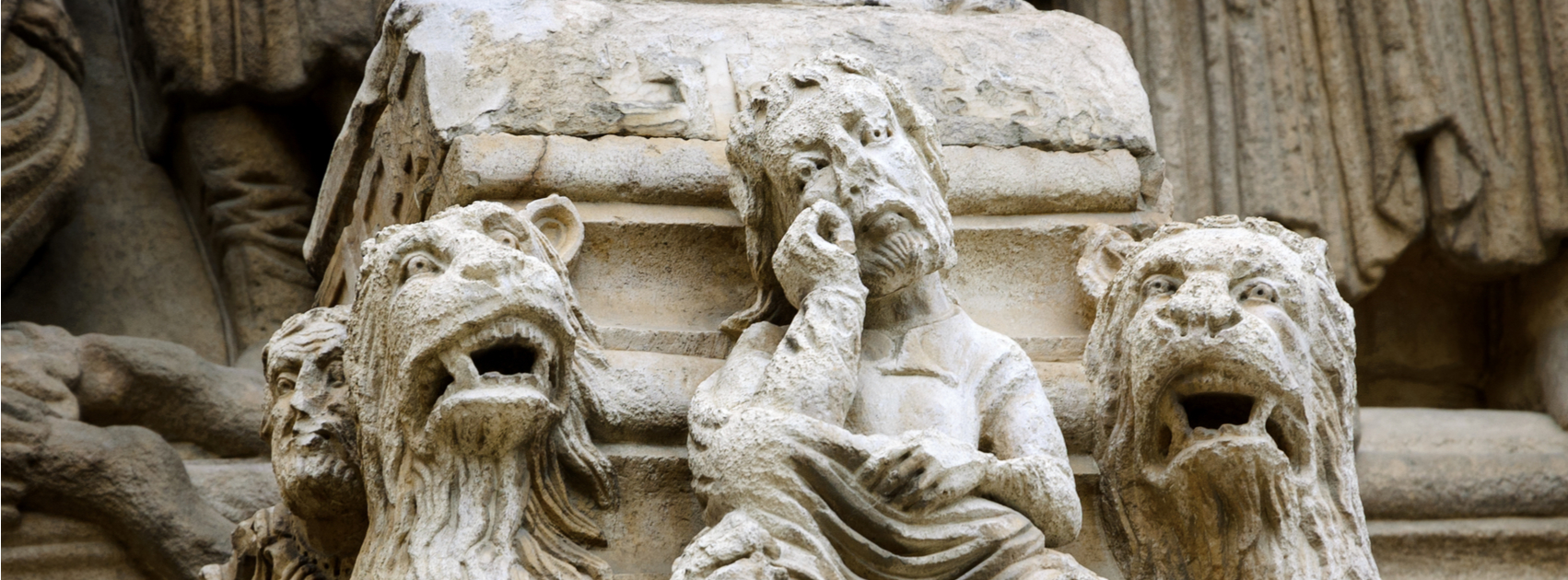
In Part One of this series we examined the basic importance of prophets, as well as, who and what are the ‘major’ and ‘minor’ prophets. Additionally in Part’s One and Two we studied the three ‘major’ prophets: Isaiah, Jeremiah, and Ezekiel, and studied the twelve ‘minor’ prophets in Parts Three, Four, Five, Six, Seven, Eight, and Nine.
In this part we will continue our examination of the ‘Old Testament Prophets…’
Prophets of the Old Testament:
As we discovered in Part One of this series there are—according to some sources—two classifications of Old Testament prophets: ‘major’ and ‘minor’ prophets.
Yet, while the majority of Old Testament prophets, who feature in more than one or two chapters of the Word, fall into these two categories, there are some, such as, Elijah, Elisha, Samuel, Nathan—Part Ten, Part Eleven, Part Twelve—and occasionally, Daniel, who are not categorized as either ‘major’ or ‘minor’ prophets despite their biblical and prophetic importance. These prophets we are simply categorizing as ‘Old Testament Prophets.’
Daniel:
Daniel was a prophet with both wisdom and the ability to interpret dreams before, and after, the kingdom of Judah was taken into Babylonian captivity in 586 BC. In fact, his ability to interpret dreams gave him great favor and likens his life, in many ways, to that of Joseph, son of Jacob, who interpreted the dreams of pharaoh and given position and honor.
Yet, just because his favor largely came from his ability to interpret dreams—as well as visions and signs from God—does not mean that is all Daniel did.
Far from it…
Daniel was only a youth when he went to Babylon. Unlike many prophets of the Old Testament, he had little to do with the kings of Judah, even Jehoiakim, mentioned in Daniel 1:1, who was king at that time.
| Prophets | Kings | Years of Reign (BC) |
| Habakkuk
(Daniel was still a youth…) |
Jehoiakim | 608-597 |
| Habakkuk
(Daniel was in captivity…) |
Jehoiachin | 597 |
| Habakkuk
(Daniel was in captivity…) |
Zedekiah | 597-586 |
|
Kingdom of Judah taken fully captive by the Babylonians in 586 BC |
||
However, Daniel did have relationships with kings of Babylon—receiving their favor—as well as King Cyrus of Persia…
Yet, how did Daniel end up in Babylon?
In King Nebuchadnezzar II’s third year of reign, he came to Jerusalem, besieging and claiming victory over King Jehoiakim of Judah—not destroying the Temple nor taking all captive as would happen during Zedekiah’s rule.
In this victory, Nebuchadnezzar took with him various articles of the Temple to place within the temple of his god, as well as certain people from Jerusalem, including members of the king’s household and nobles… one of whom was Daniel.
This is where we get to learn a little more about Daniel.
Nebuchadnezzar instructed Ashpenaz, master over his eunuchs, to find within his captives, certain young men who could serve him… not just any young men, but those who were descendants of the king of Judah and his nobles! Furthermore, they had to be…
“…young men in whom there was no blemish, but good-looking, gifted in all wisdom, possessing knowledge and quick to understand, who had ability to serve in the king’s palace, and whom they might teach the language and literature of the Chaldeans.”—Daniel 1:4
Therefore, since Daniel was chosen, he obviously fit these strict guidelines. He was attractive and wise, possibly even of royal or noble descent, and he—and three of his friends—found favor from God and therefore, man. Moreover, Daniel followed the Lord with great fervor, rejecting pleasures that were offered in favor of keeping his sight wholly on God (Daniel 1:8-16). Not only that, Daniel and his companions were given great knowledge and skill in literature and wisdom by God, with Daniel given insight to understand dreams and visions, with the ability to interpret!
Still, Daniel’s life would be difficult despite this favor. He was now living in a land where God was not worshiped, where false gods and idols were everywhere which the king could force him to serve or die.
Meanwhile, other differences not affecting his ability to serve God, could have easily changed his identity… for in Babylon, even his name was changed!
“…among those of the sons of Judah were Daniel, Hananiah, Mishael, and Azariah. To them the chief of the eunuchs gave… Daniel the name Belteshazzar; to Hananiah, Shadrach; to Mishael, Meshach; and to Azariah, Abed-Nego.”—Daniel 1:6-7
However, Daniel did have relationships with kings of Babylon—receiving their favor—as well as King Cyrus of Persia…
Yet, how did Daniel end up in Babylon?
In King Nebuchadnezzar II’s third year of reign, he came to Jerusalem, besieging and claiming victory over King Jehoiakim of Judah—not destroying the Temple nor taking all captive as would happen during Zedekiah’s rule.
In this victory, Nebuchadnezzar took with him various articles of the Temple to place within the temple of his god, as well as certain people from Jerusalem, including members of the king’s household and nobles… one of whom was Daniel.
This is where we get to learn a little more about Daniel.
Nebuchadnezzar instructed Ashpenaz, master over his eunuchs, to find within his captives, certain young men who could serve him… not just any young men, but those who were descendants of the king of Judah and his nobles! Furthermore, they had to be…
“…young men in whom there was no blemish, but good-looking, gifted in all wisdom, possessing knowledge and quick to understand, who had ability to serve in the king’s palace, and whom they might teach the language and literature of the Chaldeans.”—Daniel 1:4
Therefore, since Daniel was chosen, he obviously fit these strict guidelines. He was attractive and wise, possibly even of royal or noble descent, and he—and three of his friends—found favor from God and therefore, man. Moreover, Daniel followed the Lord with great fervor, rejecting pleasures that were offered in favor of keeping his sight wholly on God (Daniel 1:8-16). Not only that, Daniel and his companions were given great knowledge and skill in literature and wisdom by God, with Daniel given insight to understand dreams and visions, with the ability to interpret!
Still, Daniel’s life would be difficult despite this favor. He was now living in a land where God was not worshiped, where false gods and idols were everywhere which the king could force him to serve or die.
Meanwhile, other differences not affecting his ability to serve God, could have easily changed his identity… for in Babylon, even his name was changed!
“…among those of the sons of Judah were Daniel, Hananiah, Mishael, and Azariah. To them the chief of the eunuchs gave… Daniel the name Belteshazzar; to Hananiah, Shadrach; to Mishael, Meshach; and to Azariah, Abed-Nego.”—Daniel 1:6-7
While none of the dangers or differences damped Daniel’s faith in God, this name change was a Babylonian way of trying to do just that… by changing the meaning of Daniel’s true name, God is my Judge, to a name associated with a Babylonian god!
Still, Daniel followed God, and after three years, he and his friends—who we sadly know best by their Babylonian names—were brought before Nebuchadnezzar for inspection, and amongst all those he examined, none shone as did those four from Judah…
“…in all matters of wisdom and understanding about which the king examined them, he found them ten times better than all the magicians and astrologers who were in all his realm.”—Daniel 1:20
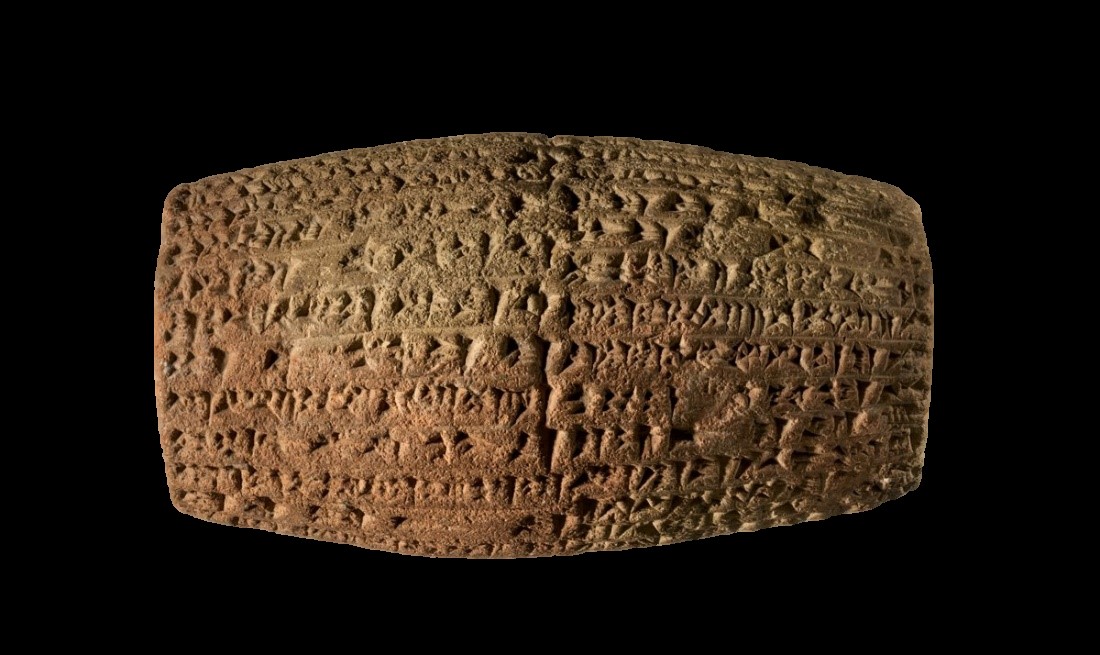
(Source: Metropolitan Museum of Art. Cuneiform cylinder describing Nebuchadnezzar II’s building of the outer walls of Babylon.)
What about Daniel’s interpretation of dreams?
Before their inspection, or after, Nebuchadnezzar had a dream that troubled him greatly. Yet, knowing his wise men would give him false interpretations to save their lives, he asked an impossible thing. He asked them to tell HIM his dream, saying that in that, he would know they could interpret it!
No one in Babylon it seemed could tell Nebuchadnezzar his dream. Therefore, despite the pleas of his wise men reasoning that only a god could tell him his dream, Nebuchadnezzar ordered ALL wise men—including Daniel and his friends—to be executed!
Daniel, upon hearing the order, asked the captain of the guard and the king himself to let him pray to his God and seek an answer. Then, in the night, God gave it. Daniel awoke and gave praise to Him—the God of his fathers—then went before King Nebuchadnezzar…
“…there is a God in heaven who reveals secrets, and He has made known to King Nebuchadnezzar what will be in the latter days…”—Daniel 2:28
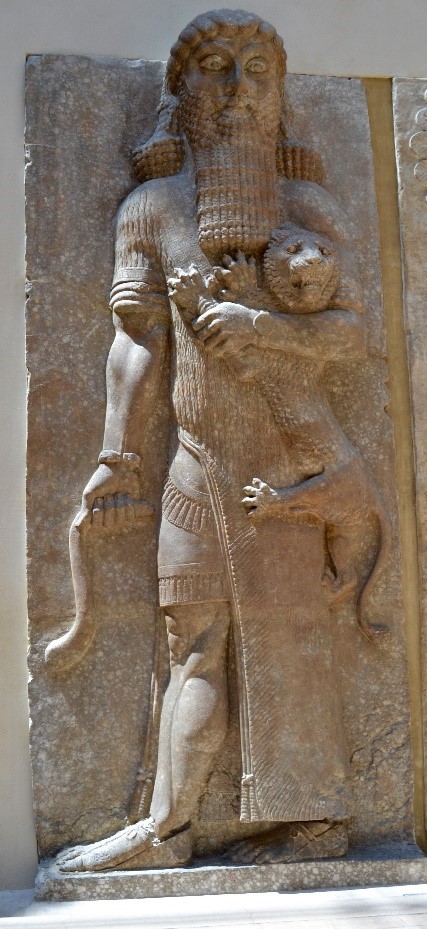
(Source: Kosmos Society center Hellenic Studies, Harvard University; Photo by Helene Emeriaud. Babylonian relief of a man, or hero, defeating a lion.)
Daniel spoke the dream, then interpreted it, and Nebuchadnezzar was in awe, falling to his knees before Daniel, saying, “Truly your God is the God of gods, the Lord of kings, and a revealer of secrets, since you could reveal this secret” (Daniel 2:47). Therefore, Daniel, still a youth, was made ruler over all the province of Babylon and chief administrator of the wise men; and with his petition to the king, his friends too were promoted, being put in leadership over the affairs of Babylon. Therefore, Daniel, highly favored, sat in the gate of the king, with great honor and position—an echo of Joseph, who had been put in charge of much after he interpreted pharaoh’s dreams.
However, after this, Daniel’s friends would have to endure the fiery furnace when they refused to bow to an idol. Yet, what the enemy meant for evil, the Lord meant for good, sending an angel to protect them and softening Nebuchadnezzar’s heart toward God.
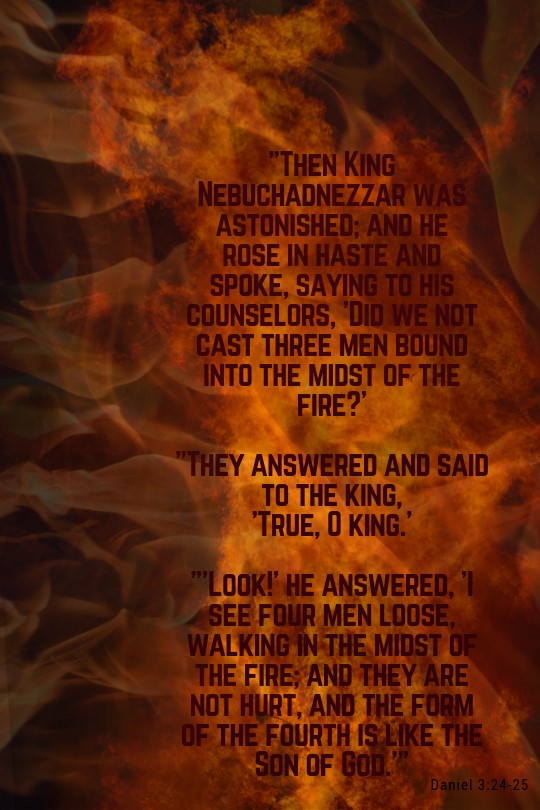
Therefore, when Nebuchadnezzar saw they had been saved by an angel of the Lord, he spoke great things of God, proclaiming that any word spoken against the God of these men would be cut to pieces!
Thus, when Nebuchadnezzar had a second dream, he begged Daniel to interpret it, his heart softening toward the Lord. So, Daniel interpreted the dream, speaking of a future when the king would be cast into the field to eat the grass and know the dew until seven times had passed and he realized that God is ruler of all.
Therefore, as Daniel had interpreted, the king was cast into the field until seven times had passed and he knew God was the Most High God, with the power to give and take away. So, Nebuchadnezzar gave praise to God!
“Now I, Nebuchadnezzar, praise and extol and honor the King of heaven, all of whose works are truth, and His ways justice. And those who walk in pride He is able to put down.”—Daniel 4:37
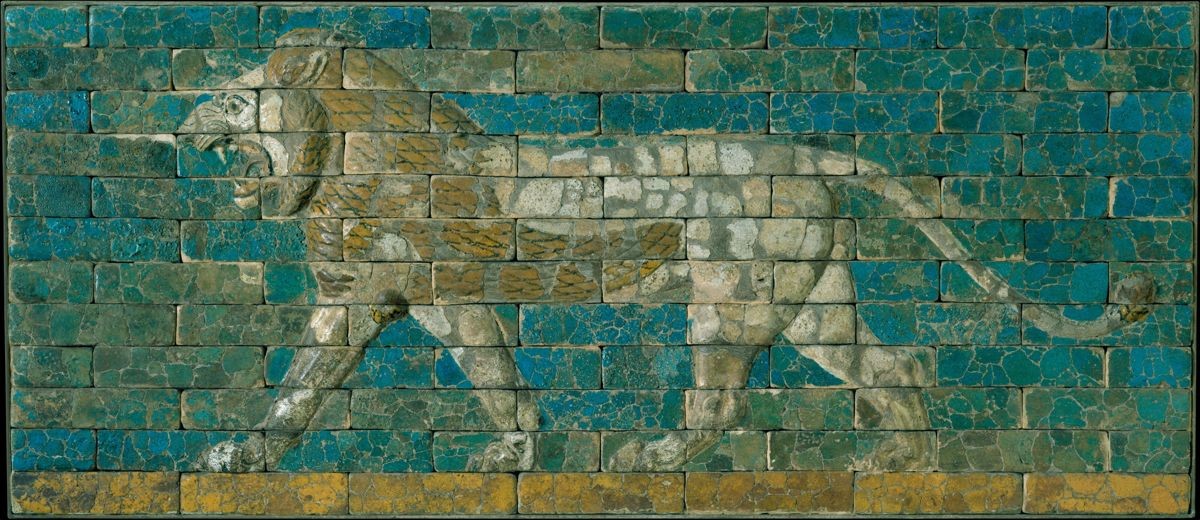
(Source: Metropolitan Museum of Art. One of many lions, and other animal—mythical and real—displayed on the Processional Way in Babylon and believed to be from the reign of Nebuchadnezzar II, the king who brought Daniel into his service.)
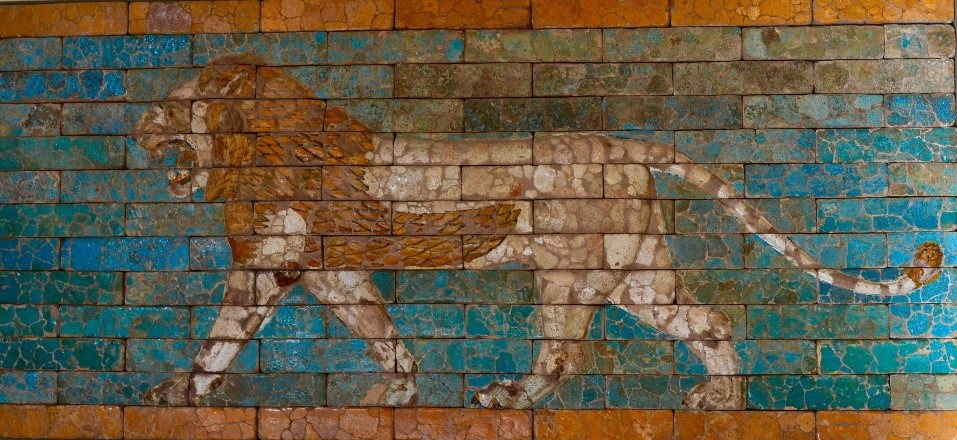
(Source: Kosmos Society center Hellenic Studies, Harvard University; Photo: Helene Emeriaud. Another lion displayed on the Processional Way and currently within the Louvre. It is believed to be from the reign of Nebuchadnezzar II.)
Now, in the process of time, the son of King Nebuchadnezzar II, Belshazzar, came to rule and he, unlike his father, did not honor the God of Judah. Therefore, Daniel wisely kept from him the visions he saw during Belshazzar’s reign…
The first vision occurring during Belshazzar’s first year… Daniel saw beasts and was given the understanding they were four kingdoms, one being exceedingly terrible, taking the saints of the Lord for a time, times and half a time, before a court would be held. The court, removing the fourth kingdom’s rule, freeing His saints and giving them the kingdoms.
The second vision occurring during Belshazzar’s third year… This vision’s interpretation was given to Daniel by Gabriel, the angel of the Lord!
“And he said, ‘Look, I am making known to you what shall happen in the latter time… for at the appointed time the end shall be. The ram which you saw, having the two horns—they are the kings of Media and Persia. And the male goat is the kingdom of Greece. The large horn that is between its eyes is the first king. As for the broken horn and the four that stood up in its place, four kingdoms shall arise out of that nation, but not with its power.’”—Daniel 8:19-22
So, the angel Gabriel continued to speak of the details of the end, finishing before Daniel fainted, being sick for days from the sheer magnitude of the word. Yet, Daniel recovered and continued his work, while Belshazzar continued his disrespect of God…
Therefore Belshazzar foolishly took the holy articles Nebuchadnezzar removed from the Temple and he, his household, and lords, drank from them, displeasing God. Thus, God set a hand writing upon the wall before the king, placing fear into his heart. None of Belshazzar’s wise men could interpret it, prompting his queen to suggest Daniel.
So Daniel came before the king, refusing his gifts—though the king would still bestow them—and speaking to him of his lack of faith in God despite all he had seen in the days of Nebuchadnezzar. Saying that by using the articles of the Lord to praise false gods, he brought upon Babylon all that was written on the wall…
“‘…MENE, MENE, TEKEL, UPHARSIN.
“‘…MENE: God has numbered your kingdom, and finished it; TEKEL: You have been weighed in the balances, and found wanting; PERES: Your kingdom has been divided, and given to the Medes and Persians.’ Then Belshazzar… clothed Daniel with purple and put a chain of gold around his neck, and made a proclamation concerning him that he should be the third ruler in the kingdom.”—Daniel 5:25-29
Despite the unfavorable interpretation, Daniel found favor. Yet, that very night the king was slain and a new ruler put in his place, Darius the Mede.
Still, Daniel found favor with Darius who placed Daniel as governor over a portion of the kingdom of Babylon. And because the Lord was with Daniel, Darius soon wished to place Daniel over ALL his kingdom! Creating amongst the governors a jealous hatred…
The other governors and councilors of Darius came to him, asking him to enact a decree that allowed no one but the king to petition any god for thirty days, or be thrown into the lions’ den. Yet, Daniel, knowing the petition was signed, went home, knelt at his upper room’s window facing Jerusalem, and prayed to the Lord—as he did three times a day. Thus, as planned, they found Daniel praying and making supplication to the Lord and brought him before the king.
Now, Darius loved Daniel and highly favored him, so, despite knowing that no decree he made could be undone, he tried to find a solution—failing, but praying, fasting, and refusing sleep the whole night Daniel was in the lions’ den.
Yet, Darius had faith in Daniel’s God, saying to Daniel that his Lord would keep Him, and when the morning came Daniel was unharmed, for God had sent an angel to shut the lions’ mouths. Thus, Darius had Daniel removed from the lions’ den and the men—with their families—were thrown into the den.

Further still, Darius declared,
“…To all peoples, nations, and languages that dwell in all the earth:
“Peace be multiplied to you.
“I make a decree that in every dominion of my kingdom men must tremble and fear before the God of Daniel.
“For He is the living God,
and steadfast forever;
His kingdom is the one which shall not be destroyed,
and His dominion shall endure to the end.
He delivers and rescues,
and He works signs and wonders
in heaven and on earth,
who has delivered Daniel from the power of the lions.”—Daniel 6:25-27
Now, while Daniel did not interpret any of Darius’ dreams or visions, it came to pass that during his reign, as Daniel was repenting to God for His people, that the angel Gabriel appeared again, telling Daniel he was greatly beloved, but further still giving him prophetic insight.
A prophecy of the coming of Messiah and beyond…
“…from the going forth of the command
to restore and build Jerusalem
until Messiah the Prince,
there shall be seven weeks and sixty-two weeks;
the street shall be built again, and the wall,
even in troublesome times.
“And after the sixty-two weeks
Messiah shall be cut off, but not for Himself;
and the people of the prince who is to come
shall destroy the city and the sanctuary.
the end of it shall be with a flood,
and till the end of the war desolations are determined.
Then he shall confirm a covenant with many for one week;
but in the middle of the week
He shall bring an end to sacrifice and offering.
And on the wing of abominations shall be one who makes desolate,
even until the consummation, which is determined,
is poured out on the desolate.”—Daniel 9:25-27
And so, Daniel, living in Babylon, continued to have visions, be given prophecies and the interpretation of dreams, visions, and signs, as he had from his youth during the reign of Nebuchadnezzar II through the reign of Nebuchadnezzar’s son Belshazzar, Darius the Mede, and even King Cyrus of Persia!
In all this time, through all the accolades and dangers, Daniel followed wholly after the Lord, obeying His commands and being used of God.
He acted as eunuch, wise man, governor, leader, councilor, third ruler, prophet, and interpreter of dreams, visions, and signs!
And during all the days of his life, nothing moved him away from the Lord.
This concludes our study of Old Testament prophets. From here, we will begin to examine the prophets of the New Testament and how, from the book of Matthew to Revelation, what was and is to come, was revealed to us in part…